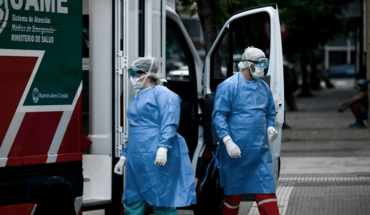Access to safe abortion in Mexico was reduced by almost half by the presence of COVID-19. Just as we were alerted to increased violence against women and unplanned pregnancies, it was more difficult to exercise that right, because women encountered closed clinics and lack of information.
Clinics performing the Legal Interruption of Pregnancy (ILE) in Mexico City went from 13 in March to 8, at this time. So, between April and June 2020, 44% applicants for elective abortions stopped attending, compared to the previous year’s trend.
Organizations such as Ipas Mexico, specializing in sexual and reproductive health, reported that there were women who wandered from one hospital to another, without having accurate information about the centers they could go to to terminate their pregnancy.
Ipas received messages from women outside hospital units asking about free or low-cost centers in order to perform the disruption. “We attended two of mexico City’s ILE clinics that appear (on the official directory of clinics) and are told they don’t have the service because of the pandemic situation,” it reads in one of the texts they received.
At the end of June this year, 6,258 women were able to terminate their pregnancy, but this is 21% lower compared to 2019, according to open data from Mexico City’s Digital Agency for Public Innovation (ADIP).
It was also common for women in other states to exercise this right. Prior to the pandemic, in the clinics of Mexico City, where abortion has been decriminalized since 2007, an average of 700 women from entities such as Puebla, Hidalgo, Morelos, Jalisco and Querétaro were treated on average each year. That figure is now 30% lower.
Civil society organizations such as the Elected Reproduction Information Group (GIRE), Ipas Mexico and Fondo María warn that this drop in access to the right to perform a safe abortion aggravates the crisis of violence in confinement. Women stay at home longer and are exposed to sexual assaults that result in unwanted pregnancies.
Calls for gender-based violence in 911 increased to record levels during the first half of 2020. Two calls per minute were recorded reporting some kind of aggression: family, partner, woman, sexual harassment or rape, according to data from the National Public Safety System.
The National Population Council ratified this October 19 that, by the pandemic, there will be more than 145 thousand additional unplanned pregnancies in Mexico, of which 21,000 will be girls and adolescents.
María Antonieta Alcalde Castro, director of Ipas Mexico, explains that giving these women and girls access to decide prevents motherhood from being forced. “That kind of motherhood can cause problems that society then doesn’t have the capacity to address,” she says in an interview Political Animal.
Having been a victim of sexual violence, Mary interrupted her pregnancy with the support of civil society, in the absence of state responses. We’ll call her Maria. He’s 11 years old. It’s her mother who speaks for her.
“We did not know that in Tabasco it could be aborted in any week of gestation, for rape, without filed complaint,” says in reference to the Mexican Official Standard (NOM) 046-SSA2-2005 ordering all public hospitals to terminate pregnancies resulting from a sexual assault, without the victim reporting the crime ministerially.
Accompaniment networks
“Stay at home” also impacted women not being able to leave their homes to look for options, either because of mobility restrictions or because they were stopped by fear of contagion.
Patricia, for example, did not want to move to Mexico City. In Nuevo León she could not interrupt her pregnancy, since in that entity serious alterations in the product are not causal to request an abortion by choice. He sought help in civil society groups to stop gestation with misoprostol and mifepristone, a combination recommended by the World Health Organization to block progesterone and cause contractions.
“I didn’t want to be alone or travel alone. I prepared everything to take the medicine at home. I thought about the women who have to go through all this alone,” she recalls.
Feminist collectives and social organizations have reported that the number of calls from women seeking information and accompaniment on safe abortion tripled during the pandemic.
“A key part of the accompaniment is that girls know they’re not committedI have a crime, but they are exercising a right,” says Vanessa Jiménez, a member of the Network I Need to Abort.
Ipas Mexico reported that they went from serving 15 messages per month to 62 in April, 212 in May and 171 in June. In other words, in the first month of confinement, the number of calls they received quadrupled and then, the next month, that number increased again by the same proportion.
“There is greater need and less supply from states. There are fewer ILE services working. We are seeing greater use of the escort networks that we give the information, but this is the responsibility of the state and the government should be looking for ways to give a better response, through modalities such as remote medicine,” says Mayor Castro of Ipas Mexico.
Capital clinics and hospitals with voluntary legal abortion services treat women from all 16 delegations and the conurbated area in 95% of cases. The remaining 5% comes from other states. Between April and June 2020, care for foreign women fell by 66%, compared to the same months in 2019.
There were women from entities such as Oaxaca, who still with the decriminalization approved in that state in September 2019, continued to move to the CDMX, but between April and June, they did not do so anymore.
“Women who could have traveled to the CDMX, to go to the ILE service, stayed in their own entity and resorted to abortion at home. I don’t think women who wanted to terminate their pregnancy have stopped doing it because of the pandemic,” says Isabel Fulda, gire’s deputy director.
For GIRE, accompanying networks made up of feminist organizations and collectives are key players in promoting access to safe abortion. Thanks to their work, women who cannot or do not want to go to health facilities or who have been denied or delayed the pregnancy termination service can have an abortion without putting their health and life at risk.
Fondo María, a network that has coined the term “abortion doulas” in Mexico, operates from a hotline available to the 32 states of the republic. Sofia Garduño, co-coordinator of the group, explains that in view of the obligation of remote work they had to route that telephone number to their private homes to continue providing the service.
“That only allows us to take one call at a time, so we ask women to be patient,” she says.
Abortion doulas have knowledge of sexual and reproductive health, as well as psychological and legal care to guide applicants for information on the safest procedure in their home entity. They also have security protocols for the interruption to take place smoothly.
When they suspect a complication that could jeopardize a woman’s health, they activate their support network to go to a public or even private clinic in Mexico City to perform the procedure.
After entering a gallbladder operation by emergency, Laura found out she was pregnant. He’s a psychology student. From the feminist talks organized at her university she met the Collective Pacts Violeta de Morelos. Thus he contacted Fondo María and was able to move to a private capital clinic to have an Endouterine Manual Aspiration (AMEU), a recommended procedure given her health condition.
Eda Alcántara Pérez, founder of this morelense collective, says that confinement has made communication doubly complicated for those who seek them. “With the pandemic, the students returned to their places of origin. It’s been harder to do the accompaniment, because they’re with their family or the aggressor,” he explains.
Local collectives such as Pactos Violeta adds almost 3,000 followers on Facebook, Fondo María has 40 thousand. Others such as Marie Stopes Mexico, an international foundation that operates sexual and reproductive health centers, reach 300 thousand.
These sites continuously disseminate information on sexually transmitted diseases, contraceptive methods and WHO-approved protocols for termination of pregnancy. They also share testimonies of women who have decided to exercise this right, as is the case with those who, having lost their jobs, decided not to continue with a pregnancy in COVID-19 times.
What we do at Animal Politics requires professional journalists, teamwork, dialogue with readers and something very important: independence. You can help us keep going. Be part of the team.
Subscribe to Animal Politics, receive benefits and support free journalism.#YoSoyAnimal
translated from Spanish: Safe abortion drops 44%; citizen networks accompany women
October 23, 2020 |





